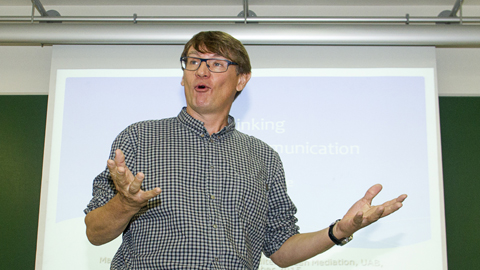"Spain is one of the world's laboratories for social movements"

06/11/2015
Professor Thomas Tufte was at the Faculty of Communication Studies of the UAB to lead the first session of the 2nd Series of Workshops on Communication and Development, with the title "A Model of Participatory Communication for Social Change", beginning a series that will continue until 11 December. The workshop had the aim of letting students participate actively in research into the major role that the media and communication can play in creating a more egalitarian society, and it was organised by the Department of Journalism and Communication Studies, through its Master's degree in Inter-Mediterranean Mediation (MIM). The project is supported by the UAB Solidarity Fund, managed by Fundació Autònoma Solidaria (FAS).
1- What is Communication for Development and Social Change (CDCS)?
It is a practice and a discipline that uses communication to build up a process of social change. It has always been linked to cooperation but in fact it has developed over the last few years and now means much more than that. We have recently seen many social movements in different countries that use communication to mobilise citizens' groups. In Spain we have the example of the 15-M social movements.
2.- Do approaches to this concept vary across the world, depending on geographical area?
-That is a good question. The answer is yes. In fact there are different definitions of the concept itself.
In North-American universities, for example, CDCS is generally taken to involve giving information and providing content. In Latin America on the other hand, there is a great tradition based more on participation, on community projects and development projects, which goes back to the 70s and 80s especially. In Africa there is a mixture of these two traditions, though the North-American tradition has spread more widely. In Europe we have a more critical perspective on integrating the two traditions.
3.- Does this depend on the political regime or democratic tradition of each country or geographical area?
Looking at Latin America, this concept has always been closely linked to politics, as a way of combating military dictatorships, protesting and mobilising against these authoritarian regimes. Over there there is a very large political dimension. In the 70s and 80s new ways to to respond to these regimes were born. In North America, however, things have been different, more technical, more to do with providing information than with politics. But civil society there is structured in a different way to other parts of the world.
4.- What contribution does Communication for Development and Social Change make to society?
On the one hand, it lets the media spread knowledge and information to the population. On the other, it is a process of participation, which aims to listen to the citizens and take account of their decisions, and that is very useful and beneficial to any society. Citizens are treated as relevant stakeholders.
5.- What projects are you working on in this area?
I am writing a book entitled "Communication and Social Change. A citizen perspective", in which I explain, on the one hand, how communication for development allows the spread of information but also how it is being used to mobilise people, to give a voice to people who had none until now.
In this book I point to a weakness in cooperation policies, namely that they are very top-down: led by institutions like the Spanish Agency for Cooperation or USA Aid. The social movements are right at the bottom, but are extremely effective. What we need is for each sector to support the other.
The institutions working in the development field need the creativity and dynamism of the social movements, to help them re-connect with citizens. Meanwhile, the social movements lack the necessary structure and sustainability, so they, in turn, need the official cooperation institutions.
6 -And what other projects are you involved in at the moment?
Right now I am coordinating two projects in eastern Africa. In Kenya and Tanzania I am studying how civil society uses mobile phones and the internet to organise its day-to-day affairs. In Spain I am studying the "Indignados" movement. In Brazil I have been looking for a long time into what they do to let citizens consult official budgets: a project that began 25 years ago in one town and has now spread to many parts of the country. These are policies to bring citizens into decision-making on policies. What all of these projects have in common is that they all listen to citizens and take their views into account.
7 -How does Spain stand in CDCS?
Historically, this concept has been regarded as useful for poor countries but now it is reaching all countries. "Indignados", for example, arose in the midst of an economic crisis. Over the last few years, we have seen how communication tools allow greater interaction between citizens and government. Spain is a laboratory for all this: what has happened here, and is still happening, is really interesting.
8 -The economic crisis has given a boost to CDCS then?
-Looking back at the 70s or the 80s you see it was the authoritarian regimes that mobilised the population, and the same happened more recently in Tunisia. In southern Europe, less so in the USA, all these participatory processes have been caused by the economic crisis.
9 -What about technology, social networks, internet etc.? What is their role in all this?
Clearly a key one. We must seize the opportunities the new technologies are offering us. Facebook or Twitter are not going to bring about the revolution by themselves but they do allow people to communicate and interact more and they give us more opportunities to make ourselves heard. Technology allows more contact between those who are in power and those they represent. This does not mean that we are going to get more democracy thanks to technology – it all depends on how it is used – but the opportunity is there.